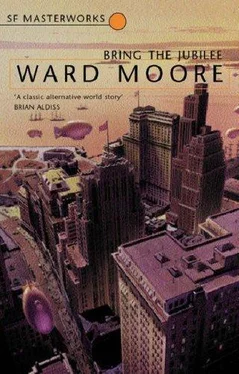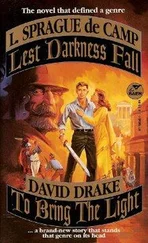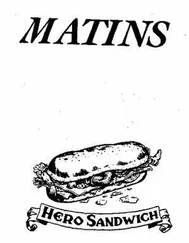Catty. Haggershaven. Are they really gone, irrevocably lost, in a future which never existed, which couldn't exist, once the chain of causation was broken? Or do they exist after all, in a universe in which the South won the battle of Gettysburg and Major Haggerwells founded Haggershaven? Could another Barbara devise a means to reach that universe? I would give so much to believe this, but I cannot. I simply cannot.
Children know about such things. They close their eyes and pray, “Please, God, make it didn't happen.” Often they open their eyes to find it happened anyway, but this does not shake their faith that many times the prayer is granted. Adults smile, but can any of them be sure the memories they cherish were the same yesterday? Do they know that a past cannot be expunged? Children know it can.
And once lost, that particular past can never be regained. Another and another perhaps, but never the same one. There are no parallel universes—though this one may be sinuous and inconstant.
That this world is a better place than the one into which I was born, and promises to grow still better, seems true. What idealism lay behind the Southron cause triumphed in the reconciliation of men like Lee; what was brutal never got the upper hand as it did in my world. The Negro is free; black legislatures pass advanced laws in South Carolina; black congressmen comport themselves with dignity in Washington. The Pacific railroad is built, immigrants pour into a welcoming country to make it strong and wealthy; no one suggests they should be shut out or hindered.
There are rumors of a deal between northern Republicans and southern Democrats, betraying the victory of the Civil War—how strange it is still, after fourteen years, to use this term instead of the familiar War of Southron Independence—in return for the presidency. If this is true, my brave new world is not so brave.
It may not be so new either. Prussia has beaten France and proclaimed a German Empire; is this the start in a different way of the German Union? Will 1914 see an Emperors' War—there is none in France now—leaving Germany facing… whom?
Any one of the inventions of my own time would make me a rich man if I could reproduce it, or cared for money. With mounting steel production and the tremendous jump in population, what a success the minibile would be. Or the tinugraph. Or controllable balloons.
The typewriter I have seen. It has developed along different and clumsier lines; inevitably, I suppose, given initial divergence. It may mean greater advances; more likely not. The universal use of gaslight must be far in the future if it is to come at all; certainly its advent is delayed by all this talk of inventing electric illumination. If we couldn't put electricity to work it's unlikely my new contemporaries will be able to. Why, they haven't even made the telegraph cheap and convenient.
And something like HX-1? It is inconceivable. Could it be that in destroying the future in which Haggershaven existed I have also destroyed the only dimension in which time travel was possible?
So strangely easily I can write the words, “I destroyed.”
Catty.
But what of Tyss's philosophy? Is it possible I shall be condemned to repeat the destruction throughout eternity? Have I written these lines an infinite number of times before? Or is the mercy envisaged by Enfandin a reality? And what of Barbara's expression as she bade me goodbye? Could she possibly
Editorial note by Frederick Winter Thammis: Quite recently, in the summer of 1953 to be exact, I commissioned the remodeling of my family home near York, Pennsylvania. Among the bundles of old books and papers stored in the attic was a box of personal effects, labeled H. M. BACKMAKER. In it was the manuscript concluding with an unfinished sentence, reproduced above.
My father used to tell me that when he was a boy there was an old man living on the farm, nominally as a hired hand, but actually as a pensioner, since he was beyond the age of useful labor. My father said the children considered him not quite right in his mind, but very entertaining, for he often repeated long, disjointed narratives of an impossible world and an impossible society which they found as fascinating as the Oz books. On looking back, he said, Old Hodge talked like an educated man, but this might simply be the impression of young, uncultivated minds.
Clearly it was in some attempt to give form and unity to his tales that the old man wrote his fable down, and then was too shy to submit it for publication. This is the only reasonable way to account for its existence. Of course, he says he wrote it in 1877, when he was far from old, and disconcertingly, analysis of the paper shows it might have been written then.
Two other items should be noted. In the box of Backmaker's belongings there was a watch of unknown manufacture and unique design. Housed in a cheap nickel case, the jeweled movement is of extraordinary precision and delicacy. The face has two dials, independently set and wound.
The second is a quotation. It can be matched by similar quotations in any of half a hundred volumes on the Civil War. I pick this only because it is handy. From W. E. Woodward's Years of Madness, p. 202 :
“…Union troops that night and next morning took a position on Cemetery Hill and Round Top… . The Confederates could have occupied this position but they failed to do so. It was an error with momentous consequences.”
Ward Moore (1903—1978) was described by various editors as “a chicken farmer from New Jersey,” the dean of unhistory, and the only native Californian ever born in Canada. Born in Madison, New Jersey, and raised in Montreal, he moved as an adolescent to New York, where he was expelled from DeWitt Clinton High School for political activism.

In his early twenties, he opened a bookstore on Chicago's Near North side, relocated it to Palm Springs, then continued west to Los Angeles as a member of the WPA Writers Project. After a wartime job on the San Francisco docks, he returned to Southern California to raise children and goats in Topanga Canyon and to work as a contract gardener. He moved his household repeatedly: to Redondo Beach, twice to New York, and once to Arkansas.
Even before he made his mark on science fiction, Ward Moore was known for his work outside the field, beginning with the novel Breathe the Air Again (1942). His first science-fiction publication called on his gardening experience; Greener Than You Think was about the disastrous introduction of mutated grass that overruns the world. Moore also wrote two notable tales of nuclear holocaust, “Lot” (1953) and “Lot’s Daughter” (1954), comparing modern Los Angeles to Sodom. His most famous work, by far, is the classic alternate history Bring the Jubilee (1953).













